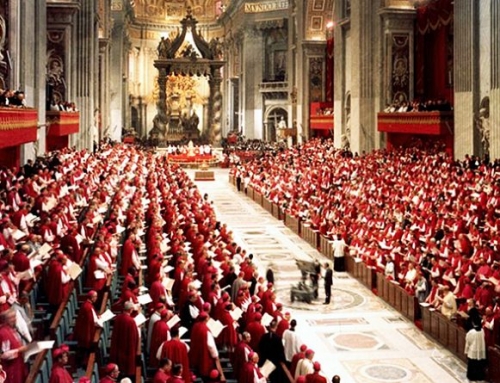In the Acts of the Apostles, which details many events of the apostles in the early days of the Church, an interesting married couple appears: Priscilla and Aquila. Jews resident in Rome, they were expelled along with other Jews by the Emperor Claudius. They migrated to Corinth where they met St Paul. They were tentmakers by trade, as was Paul, and so it is perhaps no surprise that he went to see them and stayed with them, working their trade together over some months.
The couple and Paul became co-missionaries working together to spread the faith among the Jewish community and to the Gentiles. After a year and half, they left Corinth with Paul for Ephesus where they stayed while Paul continued to Jerusalem and Antioch. Priscilla and Aquila eventually returned to Rome and it is unknown whether they died a martyr’s death.
A Couple of Faith
It’s not often we hear of married couples as key missionaries in the early Church and Priscilla and Aquila are clearly that. The couple are mentioned a further three times in St Paul’s letters to the Romans (16:3), Corinthians I (16:19) and Timothy 2 (14:19) where he sends greetings and affirms them as workers ‘with me in Christ Jesus’.
It is noteworthy that they are always mentioned together in the scriptures and worked as a couple both in their profession and in their apostolate. It is clear that they supported themselves financially, and this may have influenced Paul when he admonished the early Church of Thessalonica saying “keep away from anyone who is idle” and suggested that “anyone unwilling to work should not eat!” (2 Thes 3:6-11).
They were active lay leaders, responsible for forming the community of Corinth in the Christian faith. When Apollos appeared on the scene from Alexandria, apparently his enthusiasm for preaching needed a little refining. The scriptures record how Priscilla and Aquila took him aside and instructed him (Acts 18: 24-28). Apollos went on to become one of the great evangelisers throughout Achaia.
Their home was very much part of their ministry with Paul sending greetings to them “together with the church in their house” (1 Cor 16:14). At this time, house churches were the norm as it was some centuries before dedicated Christian churches were built.
These house churches were a very practical expression of the domestic church and are still common today in areas where Christians are persecuted. There is much we can learn for our times from their example of hospitality and making our homes available for parish ministry is one simple way for us to share our resources with our faith community.
St Paul lived with them in Corinth for an estimated eighteen months. No doubt, Priscilla and Aquila corresponded regularly with Paul providing updates on the community and seeking his counsel. It is interesting to speculate whether St Paul’s famous instruction to husbands and wives in his letter to the Ephesians (5: 21-33) was influenced by his time spent them.
Pope Francis is a fan
Pope Francis has made numerous references to Priscilla and Aquila in his speeches and writing, most recently just weeks ago when he addressed the Roman Rota.
“From Aquila and Priscilla, Christian spouses should learn how to fall in love with Christ and to be close to families, who often lack the light of faith, not through their own fault, but because they are left on the sidelines by our pastoral care: an elite pastoral care that forgets the people.”
Pope Francis also points out that couples like Priscilla and Aquila need to be sought out by priests and bishops for mission in their parishes. “How I would like this discourse not to be simply a symphony of words but rather that it may spur pastors, bishops, and parish priests to seek to love, as the Apostle Paul did, spouses as humble missionaries willing to reach our cities’ squares and buildings where the Gospel’s light and the voice of Jesus fail to penetrate. … Therefore, may pastors allow themselves to be illuminated by the Spirit today too, so that this salvific news may be fulfilled by couples who are often already prepared, but not called. They exist.”
A few months earlier Pope Francis said of them: “A house is a domestic church, in which to live communion and offer the worship of a life lived in faith, hope and charity. We must pray to these two saints Aquila and Priscilla, so that they teach our families to be like them.” (Pope Francis, Nov 13, 2019)
Pope Benedict also highlighted the example of this extraordinary couple, noting that “every house can be transformed into a small church.” He further said, “…we honour Aquila and Priscilla as models of conjugal life, responsibly committed to the service of the entire Christian community. And we find in them the model of the Church, family of God for all times.” (Pope Benedict, Feb 8, 2007)
A Mission for the married
Why is this couple from 2000 years ago so important? Because the impact of their witness as a couple – not just two faithful individuals that happened to be married – is just as needed in our Church today as it was back then.
Married couples have an important mission in the Church; this is what our Popes are reminding us. As a couple who has been active in couple ministry for over three decades, we know how important this work is and how challenging.
While there are many wonderful, faith-filled married individuals doing extraordinary work in the church, what is being recognised in Priscilla and Aquila is the unique and distinct charisms that come with both husband and wife working together in the faith.
This should not be a surprise. Afterall, marriage is a vocational Sacrament that establishes its own mini-church, the Domestic Church. In this Church, the married couple are spiritual leaders, administering and witnessing to a domestic version of each of the Sacraments.
But it does not stop at the door of the home. When St Paul talked about how husbands and wives should relate to each other, he compared it to how Christ loves the Church. Reflecting on this, St Pope John Paul II noted that Matrimony is a ‘bi-directional’ sacrament.
- In one direction it calls spouses to love in imitation of the relationship between Christ and Church, to learn from Christ and the Church how to love each other in mutual self-donation. “Give way to one another in obedience to Christ” St Paul wrote to Ephesian couples (5:21).
- In the other direction it witnesses to and leads the people of God in how to respond to Christ’s call to relationship. We are called into a nuptial relationship with Jesus and married couples are a prophetic witness this mystery.
Married couples thus have an irreplaceable leadership role in the life of the church. We are called to be a constant reminder of the love Jesus has for the people of God, a nuptial love that is freely-given, total, faithful, and fruitful.
And this is, in fact, captured in the vows we make on our wedding day; the love that makes a marriage valid is same kind of love that Jesus has for us.
A sacramental married couple who faithfully lives their wedding vows helps all of us to better understand the reality of God’s unrelenting love for each of us.
Bearing fruit
Love is always fruitful. In marriage this can take the form of children, but it is not restricted to that. There are many fruitful gifts that arise from the love of a married couple.
It is this fruitfulness that Pope Francis is calling couples to more consciously expend for the Church. One most obvious way is as leaders of marriage preparation in our parish communities and Francis has repeated this a number of times.
Married couples who are mature in their faith bring a practical wisdom to the task of preparing engaged couples and establishing a culture of accompaniment that supports couples throughout the newlywed years and beyond.
Every married couple is called to be a missionary couple – by the way we love each other we are witnesses to Christ’s love for us, His Church.
Our marriages are not just private affairs. They hold great import to the passage of society and our Church.
As married couples, we each need to be aware of this calling and, like Priscilla and Aquila, be true sacramental witnesses in our parishes and communities.







Fantastic piece ….really inspiring and so much at the heart of what we’re trying to present to young people in Britain through http://www.fertileheart.org.uk
Francine and Byron for highlighting the need for married couples to have a missionary zeal within their sacraments. Our dear late friend Fr John Rate msc, often spoke of Aquillo, Priscilla and St Paul in the early domestic Church and how each of their sacraments dove tailed together to work as missionaries in our Church. The work of Worldwide Marriage Encounter has followed this model for over 50 years. We are alive and active in Australia. Often when couples experience our weekend, they leave inspired to be missionaries in our Church and revitalised as servants in their parishes.